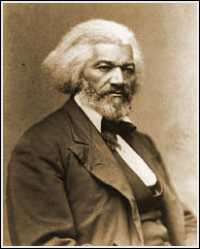FRtR > Biographies >
Frederick Douglass >
Introduction
The Autobiography of Frederick Douglass
Introduction
*
Next Chapter >
*** Quote ***
 Quite unlike Josiah Henson, who resembled Uncle Tom, Frederick Douglass
symbolizes the militant outlook of modern Negro leaders. A tall, vigorous
mulatto, he had been born in Talbot County, Maryland, of a slave mother and an
unknown white father. As his book shows, he was a sensitive man who greatly
resented the frequent abuses of his condition. Yet he managed to learn how to
read and write and to conspire successfully for freedom. He escaped in 1838,
married a free colored woman in New York City, and moved to an abolitionist
atmosphere at New Bedford, Massachusetts.
Quite unlike Josiah Henson, who resembled Uncle Tom, Frederick Douglass
symbolizes the militant outlook of modern Negro leaders. A tall, vigorous
mulatto, he had been born in Talbot County, Maryland, of a slave mother and an
unknown white father. As his book shows, he was a sensitive man who greatly
resented the frequent abuses of his condition. Yet he managed to learn how to
read and write and to conspire successfully for freedom. He escaped in 1838,
married a free colored woman in New York City, and moved to an abolitionist
atmosphere at New Bedford, Massachusetts.
Then began his remarkable career as a devoted follower of Garrison and an
influential orator and agent of the Massachusetts Anti-Slavery Society. Like
James Forten, the gifted grandfather of Charlotte Forten, he fought
segregation as well as slavery. In 1845 he published the Narrative of the
Life of Frederick Douglass, which was subsequently greatly enlarged. After
visiting England and Ireland, where he was lionized, he returned in 1847 with
enough funds to publish his newspaper, North Star, which not only
demanded immediate emancipation but also woman suffrage and other liberal
causes. As a friend of John Brown, he narrowly escaped arrest for conspiracy
and when the Civil War came, he helped to arouse the Union forces to the fact
that abolition was the real issue. Lincoln counselled with him on race
questions and postwar presidents rewarded him with various honors such as the
ministership to Haiti.
It is symbolically significant that he died in 1895, the year that Booker
T. Washington delivered his Atlanta Compromise speech, urging patient
conservative accommodation instead of Douglass' ideal of constant agitation
for early social equality.
The selections from his autobiography are taken from the 1883 edition of
Douglass' Autobiography and represent all of chapters 4, 5, and 6.
*
Next Chapter >
 Quite unlike Josiah Henson, who resembled Uncle Tom, Frederick Douglass
symbolizes the militant outlook of modern Negro leaders. A tall, vigorous
mulatto, he had been born in Talbot County, Maryland, of a slave mother and an
unknown white father. As his book shows, he was a sensitive man who greatly
resented the frequent abuses of his condition. Yet he managed to learn how to
read and write and to conspire successfully for freedom. He escaped in 1838,
married a free colored woman in New York City, and moved to an abolitionist
atmosphere at New Bedford, Massachusetts.
Quite unlike Josiah Henson, who resembled Uncle Tom, Frederick Douglass
symbolizes the militant outlook of modern Negro leaders. A tall, vigorous
mulatto, he had been born in Talbot County, Maryland, of a slave mother and an
unknown white father. As his book shows, he was a sensitive man who greatly
resented the frequent abuses of his condition. Yet he managed to learn how to
read and write and to conspire successfully for freedom. He escaped in 1838,
married a free colored woman in New York City, and moved to an abolitionist
atmosphere at New Bedford, Massachusetts.